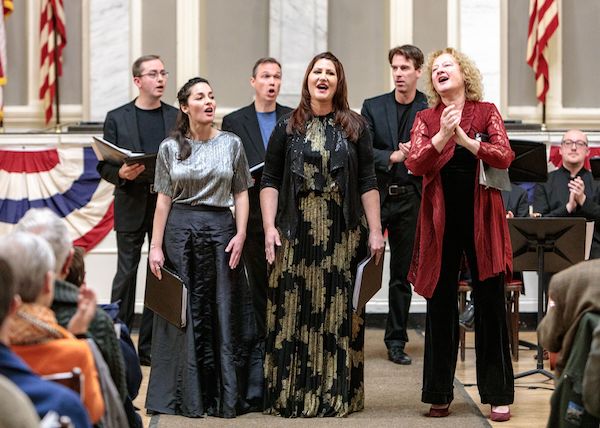The (Revolutionary) American songbook gets a joyful airing from Boston Camerata

Vernacular music composed in the years of the American Revolution often carried a fervent political message. But the popular resistance expressed in those songs was not merely a force for regime change: It helped create a society united by belief in the highest ideals.
That was the theme explored Friday night inside a cradle of the revolution, Faneuil Hall, where Anne Azéma and Boston Camerata offered a stimulating program of the era’s music. “Free America!: Early Songs of Resistance and Rebellion” collected hymns, songs, and marches voicing solidarity against the powers that were.
Composed by amateurs for amateurs, the music lacks the sophistication of classical voice leading and the nuances of text setting. The original notation often has no specific instrumentation or performance guidelines. Yet the rigid, block-like harmonies can sound with grace and resonance when rendered by early-music experts like the Boston Camerata.Under Azéma’s direction, the ensemble cast the songs in a bracing, down-home style, and with the verve of a village band, the performers captured an emotional immediacy fit for any age.
Some of the songs explored how early Americans conceived of themselves as creators of a unique and godly nation. “Trumpet of Peace,” sung by Azéma herself from the rear balcony, united the promise of the gospel with notions of liberty. Thomas Paine’s “Liberty Tree,” set to music from The American Patriotic Songbook, appealed to eternal freedom, and in Friday’s performance, tenor Michael Barrett and bass-baritone Luke Scott unfolded its phrases with assurance. William Billings’s familiar “Chester,” which featured the full ensemble in vibrant blend, recalled the glories of the pre-revolutionary spirit.
A selection of war songs captured the pain of loss. Soprano Camila Parias, alto Deborah Rentz-Moore, and mezzo-soprano Azéma joined forces for “Johnny has Gone for a Soldier,” the trio’s pure-toned melodies conveying poignant sadness. “Jolly Soldier,” a tune from The Social Harp, recounted the heroism of George Washington in ringing harmonies. “Bunker Hill” and Billings’s “David’s Lamentation” equated personal loss with the British occupation of Boston. In all, the full ensemble performed with stirring intensity.
Other songs fitted familiar tunes with revolutionary-era texts. In “Rise Columbia!,” set to Thomas Arne’s familiar “Rule Britannia,” the performers sang with the grace of an oratorio choir as violin, flute, and cello supplied gentle support.
The Shaker songs and spirituals from a later era expressed the timely American ideal of forming a welcoming community. The singers found an almost bluesy swagger in “Sanctum Te,” a buoyant Shaker song from 1842. “Pretty Home,” sung by Parias, Rentz-Moore and Azéma, imaged a gathering in heaven through foot-stomping rhythms. In the brief fuguing tune “Thirst for Gold,” Barrett, Scott, and tenor Daniel Hershey wove their phrases into clarion harmonies that captured a slave’s sense of resolve.
The evening’s soloists also conveyed longing and conviction. Scott, with his deep low register, found the soulful essence of “My Body Rock ‘Long Fever.” Parias’s pristine tone aptly relayed a dire warning to the rich in Isaac Watts’s “False are the Men of High Degree.” And Barrett delivered the lines of “O Zion Arise” with the authority of a sermonizing preacher.
The Camerata’s instrumental ensemble brought terpsichorean flair to the various dances and marches. Fiddler Eric Martin, flutist Jesse Lepkoff, and cellist Reinmar Seidler were standouts in “The Cuba March” and “The New Union.” Fifers David Cabral, Sarah MacConduibh and Heather Taskovics, and drummer Andrea Wirth, led a rousing “Yankee Doodle,” which the audience joined for the final, defiant chorus.
The Boston Camerata will perform “La Estrella: A Hispanic Christmas” 8 p.m. December 20 at All Saints Church in Ashmont; 8 p.m. December 21 at First Parish Churh of Newbury; and 4 p.m. December 22 at First Parish Church, Cambridge. bostoncamerata.org
Posted in Performances



